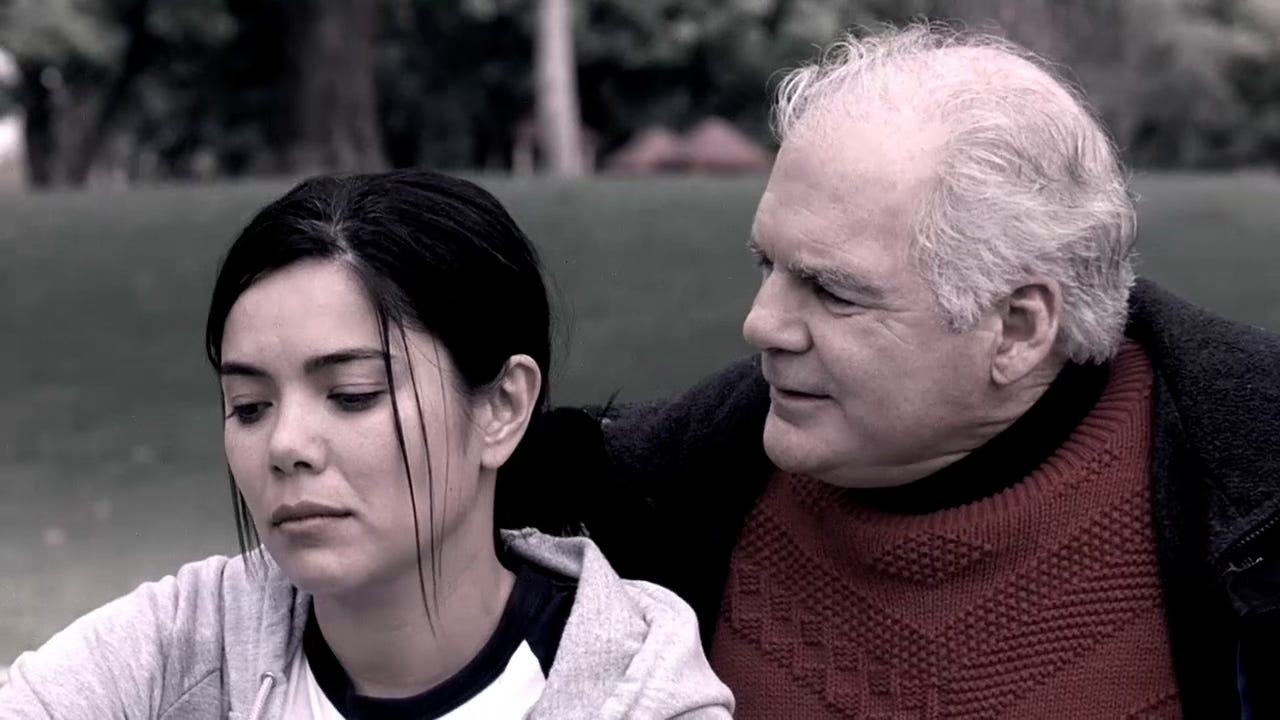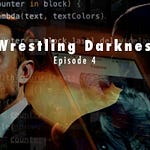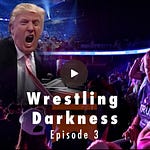A woman once told me she got divorced because of a film I made.
Seeing the film deepened her misgivings about her husband’s racism, and after years of questioning herself, she left him.
The woman was Asian and her husband was white — just like my mom and dad, and just like a couple played by Ryan Kutrona and Takayo Fischer in American Knees.
Above: Selected scenes from American Knees.
Below: The message I intended.
Love is all
Hank and Keiko take turns squeezing hands with Miles (Stephen Bishop), expressing with great fervor how delighted they are to welcome him into their home. Unspoken, yet obvious, is the fact that they are uncomfortable with his Blackness.
Hank thinks he is impervious to accusations of racism because he married an Asian woman. He objects when his daughters date men of color not because of his own feelings, but because he wants to protect his daughters from (white) society’s judgement.
Julia (Annie Katsura Rollins) and Aurora (Allison Sie) respond to this paradox in different ways. Julia stews with muted anger when her mother deploys Asian-mom insinuation to pressure her about her African American boyfriend. Aurora has taken flak from her dad about an Asian American boyfriend, but that relationship is over now. She plans to appeal to his better nature to pave the way for Julia’s marriage.
Hank is the character I altered most in adapting Shawn Wong’s canonical novel. I made Hank more charming, unassuming, and lovable because I wanted audiences to feel the ache of confronting racism in someone who means the world to you.
Someone like your Dad.
As he shrinks in her eyes
It is not only white men who want power over women’s bodies. But when gender insecurities are compounded by racial insecurities, the result can be ghastly.
In locker rooms, at pro wrestling events, and at political rallies, men think they appear strong and masculine when they talk about asserting power over women. But in the eyes of women, the opposite is true.
When Hank explains why he is meddling in his daughter’s romantic life, Aurora is overwhelmed with sadness and disappointment.
He feels his own diminishment as he shrinks in her eyes. It’s tragic for them both.
In seconds, the father she loved melts away and in his place, she sees the man he always was. What should she do now?
Aurora’s quandary, which always brings tears to my eyes, was inspired by the following words from the novel:
“Each time you let something pass that’s generally insulting or racist about Asian people and it isn’t specifically directed at you, you’re in a sense passing for white.”
“Passing for white” is an especially painful notion for mixed race Americans because it means that we are hiding behind White privilege, exploiting our lighter skin or other attributes to benefit from racist hierarchies that we otherwise denounce.
With these words, which I borrowed in the screen adaptation, Shawn Wong explained to me why I felt ashamed when my baseball teammates used racist stereotypes to poke fun at an Asian player in the other dugout. I could have said, “Hey, my mom is Chinese.” But I didn’t.
Before and since then, I have “let it slide” when people in my presence made homophobic remarks and objectified women. Usually, it was in settings where cohesion was preferable to conflict (a family gathering, a sporting contest, a news room, a film set). Sometimes, I just didn’t feel like starting an argument.
So where we draw the line?
I draw the line when bigotry is made into government policy. I consider it a civic duty to interrupt that process in any way I can.
In the film, Aurora’s family has enacted a family policy under which Julia’s African American boyfriend is welcome in private settings but not at Hank’s retirement party. This policy hurts her sister in ways she cannot accept.
When she fails to change her father’s mind, she tacitly forgives him. But she decides not to attend the party.
Thankfully, my father has never put me in such a position. But, like millions of Americans of every background, I lament the walls that Fox News and Donald Trump have created between us.
I share some of the blame. When I went to Wesleyan University and came home angry and defiant on matters of race and racism, I said things that hurt him.
I have since learned to be respectful in such conversations. But my father and I usually avoid the subject. We talk about things we both love, his grandkids mostly, and baseball.
Every now and again we try, but these days racism and politics have fused to a degree that neither of us can tell them apart, and parsing the lines between fact and fiction is as tedious as it is fruitless. It aggravates us both.
I can’t make my father in my own image any more than he can make me in his. And even if that was my goal, it would be a selfish one — more about me than about making the world a better place.
My father raised me well. He was and is warm, kind and loving. And now that I’m a father myself, I realize that I learned and gained from him all the best parts of me that I bring to fathering my own children. I value nothing more. The least I can do is love him in spite of Fox News. He is much happier. I am as well.












Share this post